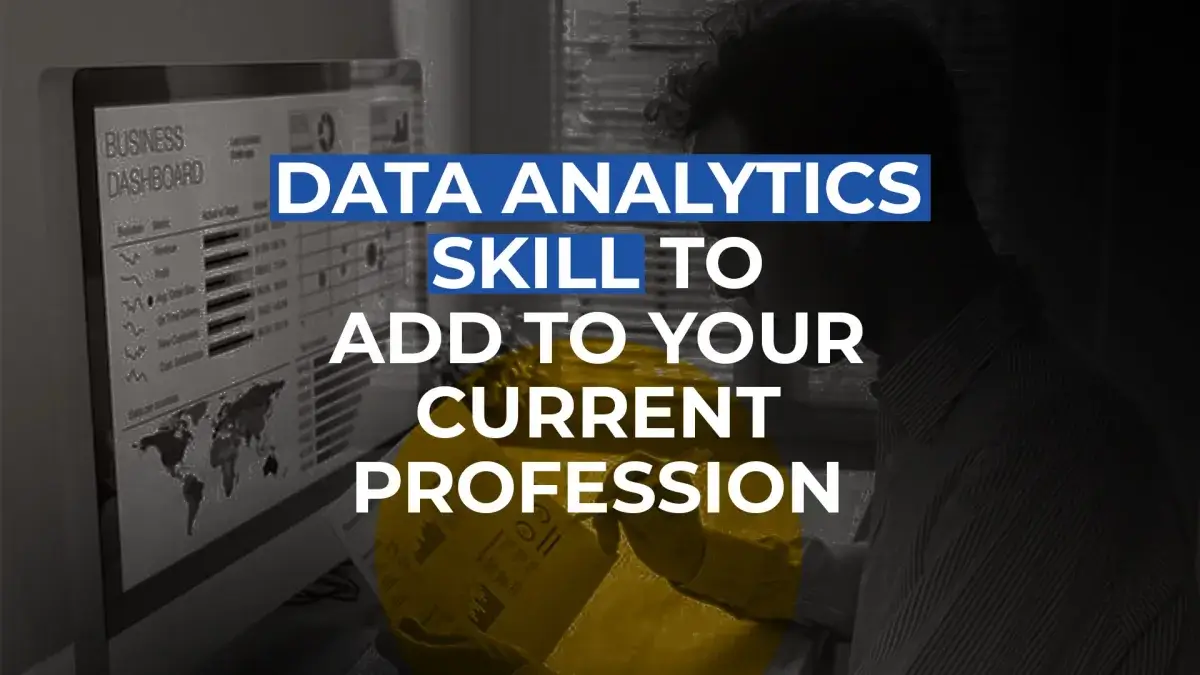Why Every Professional Should Have Data Analytics Skills

Here's What We've Covered!
The number of data humans produce each year has significantly expanded as a result of the rise of social media, digital communication, web-based services, the Internet of Things, and even digital photos. And all sectors of industry rely on such data. It’s understandable why there is such a high need for data scientists and analysts.
If you’re seeking methods to make a bigger impact at work and become a more marketable candidate in your field, honing your data analytics abilities could make you the highly sought-after worker employers are clamouring for. It’s an excellent idea to look at what the future has in store for those with impeccable data analytics skills.
Which Data Analytics Skill Can You Add To Your Current Profession
Data analysts have talents that are applicable across a variety of industries and businesses. They are not simply for departments that deal with data. Here are some skills that you can use for any industry and job type.
1. Machine learning
Machine learning, a sub-field of AI, teaches computer systems to generate predictions on their own user data and algorithms. It is a branch of software engineering, maths, and data science. Deeply knowledgeable data analysts can use machine learning skills in marketing, customer support, social media, and product development.
2. Statistics
Large-scale data analysis can be a challenging and multifaceted process. It is frequently impossible to analyse unstructured data qualitatively. Hence quantitative analysis is required. Data analysts ought to be at least familiar with fundamental statistics. But a thorough understanding of statistical ideas like categorisation, resampling techniques, and linear regression can help a lot.
3. Business intelligence
Advanced technological and statistical knowledge is helpful in almost every career, but a sound understanding of business strategy is also necessary to have an impact on an organisation.
Understanding the fundamental difficulties that your business faces can assist inform insights, forecasts, and suggestions. Business intelligence, in particular, is the process of employing information gleaned from data to make better business decisions, streamline operations, and boost profitability.
4. Critical thinking and problem solving
The practice of data analytics depends on the capacity to unbiasedly assess data that is pertinent to a challenge or purpose. Data analytics experts are competent at doing experiments, putting theories to the test, and drawing conclusions from the data at hand.
They are tasked with applying human judgement to business concerns in an increasingly automated world and thinking imaginatively about problem-solving.
5. Spreadsheets
If you have been in any industry for even 2 or 3 months, you know the use of a spreadsheet, let be it Excel or Google sheets, is immense. Especially if you are a fresher, the task of creating spreadsheets for any purpose can be in your bucket consistently.
Data analysts are taught how to work around spreadsheets along with several other tools that can make the transition into the industry way too easier. Knowing all the necessary formulas and shortcuts to spreadsheets can be a game-changer!
6. Data Management
The techniques of gathering, organising and keeping data in a way that is effective, secure, and economical are referred to as data management. Data analysts frequently manage data in some way, even though some organisations will have jobs such as database administrators, data architects and engineers, and information security analysts.
Data management systems are utilised differently by various businesses. It can be beneficial to have a thorough understanding of how databases function in both physical and cloud forms as you build your skill set.
7. Attention To Detail
If you want to be above average as an employee, we think this is one of the most important talents to have. Employing data analysts allows businesses to gather knowledge that will aid in problem-solving and revenue growth.
Having attention to detail will help you spot things or patterns others normally miss. You will be a benefit to your firm if you have the ability to recognise patterns that are advantageous or hard-to-see details.
How Do These Data Analytics Skills Help You In Your Current Profession
1. Brighten Ups Your Resume/CV
While almost everyone adds basic soft skills to their resume these days, not all of them have certificates to back them up. A data analytics course will teach you necessary skills like communication, presentation, fast thinking, data management and even problem-solving.
You will have a certificate to back you up, which will boost your chances of getting a job at reputed companies.
2. Power To Negotiate A Better Salary
You are one step ahead of everyone with data analytics skills. Not only are those in-demand skills useful on your resume, but you can leverage them to negotiate a better salary as well.
You are bringing more skills to the table than required; this sets you apart from everyone else and also makes you a better asset to the company.
3. Multiple Specialisations Open Better Growth Opportunities
Since data analytics courses teach you several things, you will be qualified for a variety of roles. Even if you decide not to make a huge career jump, you will be qualified to take on or be a part of a variety of projects.
4. Helps You Stand Out (In A Good Way, Obviously)
A data analytics course will teach you programming skills, data management, knowledge to use complicated yet necessary softwares/tools, presentation skills, communication and a lot more.
You will be the all-rounder in your company who’ll know how to manage almost anything. From making stunning presentations to providing data points and making decisions on your feet, you got it all in you.
A course in data analytics not only opens up a new career opportunity for you, which is in high demand right now but will also help you grow in your current profession. The only thing you must consider is learning from a reputed institute with years of experience and experts to teach.
Why IMS ProSchool’s Data Analytics Is Perfect For Everyone
The module of IMS ProSchool’s course is crafted especially for freshers in the industry. It will start from the basics and cover all necessary topics. It is perfect for you if you have no idea about the data world. This program also provides you with an AICTE-approved qualification and NSDC certification.
You also get different study options that you can choose from according to your schedule. Not just this, the main highlight of this course is that IMS ProSchool provides a practical learning experience as well. You’ll be learning how to use the theoretical knowledge right there instead of figuring it out later on your own.
Proper guidance, mentorship from industry experts and a flexible learning schedule, IMS Proschool provides all of the above and much more.
Conclusion
Data analytics skills are not just for data scientists and data analytics. Almost every person in the corporate world can use these skills to grow in their respective careers. From careers in digital marketing to sales and manufacturing and even in finance, these skills are useful for everyone.
Now is the time to add these skills to your skill set and grow.
Resent Post
>
Best Study Abroad Courses for Commerce Graduates
>
Emerging commerce career options in India (2026): From CA to Data Analyst
>
ACCA Opportunities You Didn’t Know About – Think Beyond Audit!
>
Which Courses After 12th Commerce With High Salary Are in Demand Worldwide?
>
How to Find ACCA Jobs Online After Qualifying: Real Portals, Tips & Career Guidance
Follow Us For All Updates!





